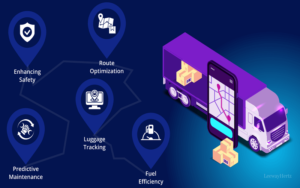Understanding the Landscape of E-Invoicing in Malaysia
4 min readIn today’s dynamic world of digital finance, E-Invoicing stands out as a transformative force for global businesses. It effectively transposes traditional paper-based invoice handling to an automated electronic system, significantly enhancing efficiency, slashing costs, and ensuring compliance. Asia displays varied levels of E-Invoicing maturity. South Korea boasts a sophisticated platform while India progresses swiftly under its GST regime. China’s Golden Tax System underscores its ambition to fully integrate invoicing within the national tax structure.
The E-Invoicing landscape in Malaysia is on a burgeoning path toward modernization and efficiency. With the advent of technology permeating every sector of business, Malaysia has not stayed behind in adopting E-Invoicing practices to streamline its business transactions.
Malaysia Embraces Digital Revolution: The Rise of E-Invoicing
In the realm of digital progress, the participation of Malaysian enterprises in adopting electronic invoicing mirrors the international momentum towards such technological advancements. The ambition within Malaysia’s E-Invoicing landscape is demonstrated through efforts to streamline corporate processes, augment operational efficacy, and deter the informal economy by refining invoice management and tax revenue collection.
The government of Malaysia has taken decisive steps to cultivate an environment that is supportive of electronic invoicing. In 2020, the Ministry of Finance decreed that electronic invoicing would be a compulsory practice for all vendors to the government. This measure stands as a testament to Malaysia’s dedication to re-engineering its public sector, fostering transparency, and eradicating fraudulent activities and mismanagement in procurement operations.
Malaysia has aligned with international norms by embracing the PEPPOL framework for digital invoicing, thereby positioning itself within a network that enhances cross-border commerce. This strategic choice permits Malaysian enterprises to exchange E-Invoice with international counterparts adhering to the same set of standards.
Moreover, adherence to governmental mandates is only one facet of why Malaysian enterprises are gravitating towards E-Invoicing; many acknowledge its potential for cost reduction. The conventional methodology of paper invoicing imposes financial burdens in terms of printing, mailing, and archiving documents. E-Invoicing, conversely, slashes these expenses substantially and diminishes the prevalence of manual errors that could lead to payment delays or monetary disputes.
Advancements in technology like Artificial Intelligence (AI) are being integrated into E-Invoicing frameworks, thus propelling these systems beyond simple digitized replicas of paper-based invoices. Utilizing AI capacitates automation in data input tasks—ensuring invoice precision aligns with purchase specifications or contractual agreements, elevating spend management efficiency, and may even include predictive analysis that offer improved insights into cash flow forecasting.
Nevertheless, this transition is accompanied by significant hurdles. Particularly for smaller businesses, which necessitate investment in infrastructure during a period marked by recovery from economic setbacks instigated by the COVID-19 crisis. Additionally, there is a learning curve tied to new technology adoption and compliance with data privacy laws—an aspect that may decelerate uptake among more traditionally inclined businesses.
From Paper to Pixel: The Hurdles of Implementing E-Invoicing in Malaysian Businesses
In Malaysia, the shift towards electronic invoicing, while delivering a plethora of advantages, simultaneously presents several significant challenges:
Capital Investment Challenges:
Small to mid-sized businesses may encounter fiscal limitations in allocating funds towards essential E-Invoicing infrastructure, including software acquisition, hardware upgrades, and secure online connectivity. This is particularly relevant during the economic recuperation phase post-COVID-19 pandemic.
Technological Onboarding:
The induction of novel technological solutions may prove to be a considerable hurdle for smaller or more conventionally operated enterprises. Such a learning curve could decelerate the switchover and potentially foster a reticent attitude toward innovation within the company.
Standardization Compliance:
Adherence to the PEPPOL framework along with other global E-Invoicing norms necessitates a comprehensive grasp of the requisite technical details and might call for revisions in current systems and operational methodologies.
Confidentiality and Cybersecurity:
Transitioning to electronic invoice systems obligates companies to meticulously comply with data privacy legislations and deploy formidable cyber defense mechanisms to safeguard confidential financial information against cyber-attacks and illicit intrusions.
System Integration:
The amalgamation of E-Invoicing solutions with extant financial and accounting infrastructures poses intricate challenges that could demand additional investment for seamless integration.
Educational Initiatives and Resources:
The provision of thorough education and resources is imperative for ensuring employee adeptness in maneuvering newly implemented E-Invoicing platforms, representing a significant endeavor on the part of the enterprise.
Financial Justification:
Although E-Invoicing has the potential to generate cost efficiencies over time, it is incumbent upon businesses to perform a meticulous cost-benefit evaluation to substantiate the preliminary expenses incurred during the electronic transition.
Universal Accessibility:
It is pivotal to design E-Invoicing systems that are readily accessible and accommodating for all commercial entities, inclusive of those situated in geographically isolated or rural locales, thereby enabling broad-based assimilation.
Concurrent Vendor-Customer Migration:
Persuading all stakeholders, namely suppliers, and clients, to collectively adopt E-Invoicing is a complex negotiation that demands synchrony and mutual concurrence regarding system compatibility.
Regulation Adaptability:
Continuously monitoring evolving regulatory frameworks and ensuring E-Invoicing practices remain compliant with governmental stipulations represent a perpetual responsibility for businesses.
Summary:
Malaysia is at the forefront of digital transformation, with its businesses increasingly adopting E-Invoicing to improve efficiency and combat informal economic practices. The Malaysian government mandates E-Invoicing for all government vendors since 2020, enhancing public sector integrity and reducing fraudulent procurement activities. By implementing the PEPPOL framework, Malaysia joins an international network facilitating seamless cross-border e-invoice transactions.
With E-Invoicing, companies reduce costs associated with traditional paper invoices and minimize human error, streamlining financial management. However, transition challenges persist, particularly for small firms grappling with the economic aftereffects of the pandemic and navigating technological learning curves.






